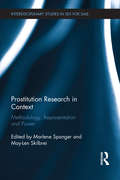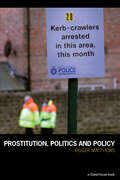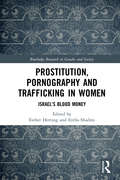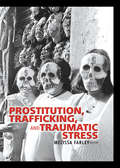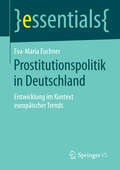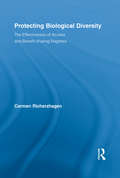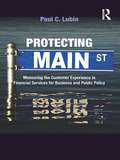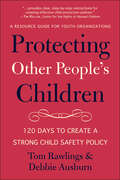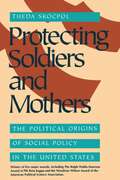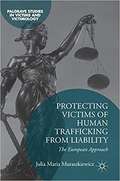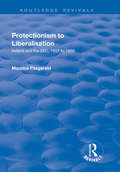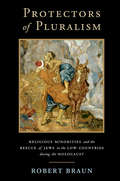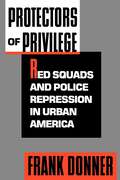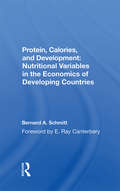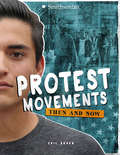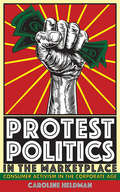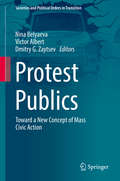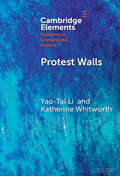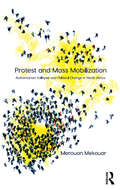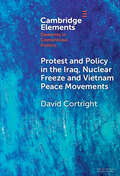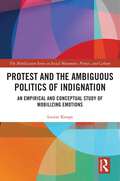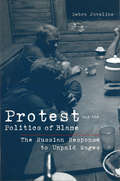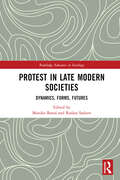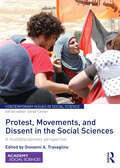- Table View
- List View
Prostitution Research in Context: Methodology, Representation and Power (Interdisciplinary Studies in Sex for Sale)
by Marlene Spanger May-Len SkilbreiThe starting point for this book is the question of how we research sex for sale and the implications of the choices we make in terms of epistemology and ethics. Which dilemmas and ethical aspects need to be taken into account when producing qualitative data within a highly politicised and moral-infected realm? These two questions are exactly what Spanger and Skilbrei aim to unpack in this unusual interdisciplinary methodology book, Prostitution Research in Context. The book offers contributions from a number of scholars who, based on their reflections on their own research practice and the existing knowledge field, discuss ongoing methodological issues and challenges representative of international research on sex for sale. Some chapters deal explicitly with methodological dilemmas in research; others thematise the encounter between prostitution research and general texts on epistemology. Other chapters again actively engage with the ethical dilemmas that research on the topic of sex for sale can entail. The authors represent different disciplines, but share an interest in engaging in reflexive research practices informed by feminism and feminist epistemologies. An authoritative contribution to the field, this innovative volume will appeal to international scholars and students from across the social sciences and humanities in areas such as sociology, anthropology, criminology, media studies, feminist studies, human geography and history.
Prostitution, Politics & Policy
by Roger MatthewsProstitution has become an extremely topical issue in recent years and attention has focused both on the situation of female prostitutes and the adequacy of existing forms of regulation. Prostitution, Politics & Policy brings together the main debates and issues associated with prostitution in order to examine the range of policy options that are available. Governments in different parts of the world have been struggling to develop constructive policies to deal with prostitution – as, for example, the British Home Office recently instigated a £1.5 million programme to help address the perceived problems of prostitution. In the context of this struggle, and amidst the publication of various policy documents, Prostitution, Politics & Policy develops a fresh approach to understanding this issue, while presenting a range of what are seen as progressive and radical policy proposals. Much of the debate around prostitution has been polarized between liberals – who want prostitution decriminalized, normalized and humanized – and conservatives – who have argued that prostitution should be abolished. But, drawing on a wide range of international literature, and providing an overview that is both accessible to students and relevant to policy makers and practitioners, Roger Matthews proposes a form of radical realism that is irreducible to either of these two positions.
Prostitution, Pornography and Trafficking in Women: Israel's Blood Money (Routledge Research in Gender and Society)
by Esther Hertzog Erella ShadmiThis book critically analyzes the sex industry in Israel, using feminist concepts and scholarship to elaborate on the power of prostitution to shape a world in which women are objects for fulfilling men's desires. A comprehensive collection of research-based articles that examine prostitution, trafficking in women and pornography from divergent disciplinary angles, it reveals the interconnectedness of these three aspects of the sex trade which objectifies, commercializes and exploits human – and in particular women’s – sexuality. Showing these practices to be embedded in a capitalist and patriarchal oppressive context that is accommodated by state institutions, this volume rejects the argument that it is possible to choose prostitution, and that feminist pornography is possible. With case studies including the conspicuous context of migration that attracts sex traffickers, the liberal discourse introduced by cinema, the media and the arts that serve to legitimate prostitution and pornography, the chauvinist-macho culture that perceives and treats women as sex objects, and the issues of male prostitution and men as clients, Prostitution, Pornography and Trafficking in Women: Israel’s Blood Money constitutes a study of Israel as a unique context in which the sex trade can prosper, in spite of geographical, religious and institutional constraints. As such, it will be of interest to scholars of sociology, anthropology, history, cultural studies and gender and women’s studies.
Prostitution, Trafficking, and Traumatic Stress
by PhD, Melissa FarleyProstitution, Trafficking, and Traumatic Stress offers the reader an analysis of prostitution and trafficking as organized interpersonal violence. Even in academia, law, and public health, prostitution is often misunderstood as "sex work." The book&’s 32 contributors offer clinical examples, analysis, and original research that cou
Prostitutionspolitik in Deutschland: Entwicklung im Kontext europäischer Trends (essentials)
by Eva-Maria EuchnerEva-Maria Euchner führt in das Thema der Prostitutionspolitik ein und stellt klassische Regulierungsregime sowie die zentralen Wertekonflikte des Politikfelds vor. Ferner gibt die Autorin einen Überblick über die verschiedenen Regulierungsmodelle in Europa zwischen 1960 und 2010, was auch eine Beschreibung der Herangehensweise in Deutschland beinhaltet. Darüber hinaus analysiert sie die Ursachen des deutschen Wegs. Die liberale Handhabung von Prostitution in Deutschland ist insbesondere auf die Problemdefinition und die Rolle der Partei Bündnis 90/Die Grünen zurückzuführen. Aktuell motiviert eine veränderte Problemwahrnehmung neue regulative Schritte, die aber voraussichtlich keinen Paradigmenwechsel einleiten werden, da ein starker parteipolitischer Agent fehlt.
Protecting Biological Diversity: The Effectiveness of Access and Benefit-sharing Regimes (Routledge Studies in Development and Society #24)
by Carmen RicherzhagenDuring the last ten years the enormous global loss of biodiversity has received remarkable attention. Among the numerous approaches undertaken to stop or lessen this process, access and benefit-sharing (ABS), a market-based approach, has emerged as among the most prominent. In theory, ABS turns biodiversity and genetic resources from an open access good to a private good and creates a market for genetic resources. It internalizes the resources’ positive externalities by pricing the commercial values for research and development and makes users pay for it. Users’ benefits are shared with the resource holders and set incentives for the sustainable use and the conservation of biodiversity. Carmen Richerzhagen, however, finds that in practice there are significant questions about the effectiveness of the approach in the protection of biodiversity and about the fair and equitable sharing of benefits arising from the commercialization. Utilizing the empirical findings of three case studies of biodiversity-providing countries - Costa Rica, the Philippines and Ethiopia - and one case study of a community of user countries, the European Union (EU), Richerzhagen examines the effectiveness of ABS through the realization of its own objectives.
Protecting Main Street: Measuring the Customer Experience in Financial Services for Business and Public Policy
by Paul C. LubinFirst Published in 2010. Routledge is an imprint of Taylor & Francis, an informa company.
Protecting Other People's Children: 120 Days to a Strong Child Safety Policy
by Debbie Ausburn Tom RawlingsA one-of-a-kind guide for youth-serving organizations to help build out their own child protection policies in just 120 days.Expert guidance, worksheets, and checklists take the guesswork out of confusing industry standards—so you can focus on helping kids learn, grow, and flourish.Written by two legal experts with more than 60 years of experience helping youth-serving organizations (YSOs), Protecting Other People's Children provides a blueprint for organizations to develop their own child safety policies.From private schools to church youth groups to mentoring organizations to summer camps, YSOs provide unparalleled opportunities for children to learn, grow, and flourish. Unfortunately, because they serve a vulnerable population, those groups also face unparalleled risks.With Protecting Other People's Children, organizations will be able to: Recognize and avoid common pitfalls and mistakes Set up a workable timeline for implementationCreate and confirm their own commitments and principlesAccess several supportive worksheets, checklists, and activity guidesLearn how to pick the right people (leaders, team, volunteers, etc.)Understand and adhere important protocols and guidelinesAppropriately respond to serious incidentsProtecting Other People's Children enables YSOs to develop robust, sustainable child protection plans, holding everyone accountable while protecting both the programs and the minors they serve.
Protecting Soldiers And Mothers: The Political Origins Of Social Policy In The United States
by Theda SkocpolIt is a commonplace that the United States lagged behind the countries of Western Europe in developing modern social policies. But, as Theda Skocpol shows in this startlingly new historical analysis, the United States actually pioneered generous social spending for many of its elderly, disabled, and dependent citizens. During the late nineteenth century, competitive party politics in American democracy led to the rapid expansion of benefits for Union Civil War veterans and their families. Some Americans hoped to expand veterans' benefits into pensions for all of the needy elderly and social insurance for workingmen and their families. But such hopes went against the logic of political reform in the Progressive Era. Generous social spending faded along with the Civil War generation. Instead, the nation nearly became a unique maternalist welfare state as the federal government and more than forty states enacted social spending, labor regulations, and health education programs to assist American mothers and children. Remarkably, as Skocpol shows, many of these policies were enacted even before American women were granted the right to vote. Banned from electoral politics, they turned their energies to creating huge, nation-spanning federations of local women's clubs, which collaborated with reform-minded professional women to spur legislative action across the country. Blending original historical research with political analysis, Skocpol shows how governmental institutions, electoral rules, political parties, and earlier public policies combined to determine both the opportunities and the limits within which social policies were devised and changed by reformers and politically active social groups over the course of the late nineteenth and early twentieth centuries. By examining afresh the institutional, cultural, and organizational forces that have shaped U.S. social policies in the past, Protecting Soldiers and Mothers challenges us to think in new ways about what might be possible in the American future.
Protecting Victims of Human Trafficking From Liability: The European Approach (Palgrave Studies in Victims and Victimology)
by Julia Maria MuraszkiewiczThis books demonstrates the difficulty of protecting victims of human trafficking from being held liable for crimes they were compelled to commit in the course, or as a consequence, of being trafficked, under current European law. The legislation remains vague and potentially inadequate to recognise victimhood, safeguard the human rights of victims, and avoid further victimisation. Wiliamson explains how the non-liability principle is rooted in criminal and human rights law, and proposes a more efficient provision and framework which would protect trafficked persons, and do better to encourage victims to act as witnesses in criminal proceedings against the perpetrators. In doing so the book will provide relevant stakeholders, including policy makers and law enforcement authorities, with a better understanding of the non-liability principle and how it ought to be used in practice.
Protectionism to Liberalisation: Ireland and the EEC, 1957 to 1966
by Maurice FitzgeraldThis title was first published in 2000. This work examines Irish government towards European integration in the second post-war decade by concentrating on crisis points or flash points, it does this in a fairly subject-oriented manner concerning Dublin's decision-making processes. The central themes of this study are concentrated on economic matters, but they deal with other tenets when relevant too, be they of a cultural, diplomatic, ideological, military, political or social nature.
Protectors of Pluralism: Religious Minorities and the Rescue of Jews in the Low Countries during the Holocaust (Cambridge Studies in Contentious Politics)
by Robert BraunProtectors of Pluralism argues that local religious minorities are more likely to save persecuted groups from purification campaigns. Robert Braun utilizes a geo-referenced dataset of Jewish evasion in the Netherlands and Belgium during the Holocaust to assess the minority hypothesis. Spatial statistics and archival work reveal that Protestants were more likely to rescue Jews in Catholic regions of the Low Countries, while Catholics facilitated evasion in Protestant areas. Post-war testimonies and secondary literature demonstrate the importance of minority groups for rescue in other countries during the Holocaust as well as other episodes of mass violence, underlining how the local position of church communities produces networks of assistance, rather than something inherent to any religion itself. This book makes an important contribution to the literature on political violence, social movements, altruism and religion, applying a range of social science methodologies and theories that shed new light on the Holocaust.
Protectors of Privilege: Red Squads and Police Repression in Urban America
by Frank DonnerThis landmark exposé of the dark history of repressive police operations in American cities offers a richly detailed account of police misconduct and violations of protected freedoms over the past century. In an incisive examination of undercover work in Chicago, Los Angeles, New York, and Philadelphia as well as Washington, D.C., Detroit, New Haven, Baltimore, and Birmingham, Donner reveals the underside of American law enforcement.
Protein, Calories, And Development: Nutritional Variables In The Economics Of Developing Countries
by Bernard SchmittProduction of world food supplies is related to more complicated socioeconomic variables than have previously been analyzed. Besides traditional inputs of land, labor, and fertilizer, the technological capabilities and a variety of nutritional and other human capital components are significant independent variables in explaining agricultural production in the developing world. The integration of economic analyses with the concepts of nutritional science offers an expanded and effective means for analyzing the complex problems of agricultural production in nutritionally deficient countries. Bernard Schmitt traces the circular relationship between nutrition and human capital, labor productivity, food production, and per capita consumption of calories and protein. He defines the basic nutritional terms that are most useful to economists in analyzing agricultural and foodrelated questions and provides examples that stress the importance of concentrating on nutritional quality as well as gross quantity. Transformations are used to convert quantities into basic nutritional components, allowing more meaningful quantitative analyses in an econometric framework. Dr. Schmitt presents a flexible methodology for forecasting commodity production, using it to make projections for the developing countries for each major commodity group and to test various policy alternatives such as extensive trade, expanded food assistance programs, substantial resource or input expansion, further expansion of Green Revolution technology, and development of alternatives to agriculture. Although he is certain that gains can be accomplished through population control and agricultural advances, supplemented by alternative nutritional sources, he concludes that conditions in nutritionally deficient countries are unlikely to improve, on average, through the mid-1980s.
Protektion 4.0: Das Digitalisierungsdilemma (Die blaue Stunde der Informatik)
by Günter MüllerDas Buch beschreibt Datenschutz erstmals als Offenheit (Transparenz) statt Datensparsamkeit. Der Autor beschreibt als Voraussetzung dazu einen Besitztitel auf Daten. Die Umsetzung erfolgt über Big Data, deren Techniken so ausgelegt sind, dass Daten zur „handelbaren“ Ware werden können, indem dokumentierbar wird, wie von wem wozu Daten verwendet worden sind. Transparente Verwendung auch in Hinsicht auf den Nutzen oder die Notwendigkeit statt Verbergen wird als neues Privatheitsmodell vorgeschlagen. Die Synchronisation der Entwicklung von Technik und Gesellschaft steht dabei im Vordergrund. Zahlreiche Fallstudien erhöhen den praktischen Nutzen des Buches.
Protest Movements: Then and Now (America: 50 Years of Change)
by Eric BraunDiscusses the main concerns of the protest movements of the 1960s and how those have evolved since; what's changed for the better, what might be worse, and where do we go from here.
Protest Politics in the Marketplace: Consumer Activism in the Corporate Age
by Caroline HeldmanProtest Politics in the Marketplace examines how social media has revolutionized the use and effectiveness of consumer activism. In her groundbreaking book, Caroline Heldman emphasizes that consumer activism is a democratizing force that improves political participation, self-governance, and the accountability of corporations and the government. She also investigates the use of these tactics by conservatives.Heldman analyzes the democratic implications of boycotting, socially responsible investing, social media campaigns, and direct consumer actions, highlighting the ways in which such consumer activism serves as a countervailing force against corporate power in politics. In Protest Politics in the Marketplace, she blends democratic theory with data, historical analysis, and coverage of consumer campaigns for civil rights, environmental conservation, animal rights, gender justice, LGBT rights, and other causes. Using an inter-disciplinary approach applicable to political theorists and sociologists, Americanists, and scholars of business, the environment, and social movements, Heldman considers activism in the marketplace from the Boston Tea Party to the present. In doing so, she provides readers with a clearer understanding of the new, permanent environment of consumer activism in which they operate.
Protest Publics: Toward a New Concept of Mass Civic Action (Societies and Political Orders in Transition)
by Victor Albert Nina Belyaeva Dmitry G. ZaytsevThis book examines the waves of protest that broke out in the 2010s as the collective actions of self-organized publics. Drawing on theories of publics/counter-publics and developing an analytical framework that allows the comparison of different country cases, this volume explores the transformation from spontaneous demonstrations, driven by civic outrage against injustice to more institutionalized forms of protest. Presenting comparative research and case studies on e.g. the Portuguese Generation in Trouble, the Arab Spring in Northern Africa, or Occupy Wall Street in the USA, the authors explore how protest publics emerge and evolve in very different ways – from creating many small citizen groups focused on particular projects to more articulated political agendas for both state and society. These protest publics have provoked and legitimized concrete socio-political changes, altering the balance of power in specific political spaces, and in some cases generating profound moments of instability that can lead both to revolutions and to peaceful transformations of political institutions.The authors argue that this recent wave of protests is driven by a new type of social actor: self-organized publics. In some cases these protest publics can lead to democratic reform and redistributive policies, while in others they can produce destabilization, ethnic and nationalist populism, and authoritarianism. This book will help readers to better understand how seemingly spontaneous public events and protests evolve into meaningful, well-structured collective action and come to shape political processes in diverse regions of the globe.
Protest Walls: Co-authoring Contentious Repertoires (Elements in Contentious Politics)
by Yao-Tai Li Katherine WhitworthProtest walls have played an important role in movement communication and mobilizing the public. We focus on contentious performances and the way diverse actors co-authored spaces into the protest walls that were seen in Hong Kong and other countries including Lebanon, Iraq, and Taiwan. We argue that once created, protest walls can become objects symbolic of dissent. They exist as a lexicon-a complex language of symbols and spatial practices. This language is now an internationally understood method of protest which has a high degree of transferability and can be adapted into local contentious contexts or used to transmit local concerns into the international consciousness. Finally, we show that the protest wall can shed new light on the relationship between activists, their claims and their targets that does not exist in other types of contentious performance.
Protest and Mass Mobilization: Authoritarian Collapse and Political Change in North Africa
by Merouan MekouarWhy and how do some acts of protest trigger mass mobilization while others do not? Using the cases of Morocco, Algeria, Tunisia, and Libya, Mekouar argues that successful mass mobilization is the result of a surprise factor, whose impact and exceptionality is amplified by the presence of influential political agents during the early phase of protest, as well as by regime violence and unusual media coverage. Together this study argues that these factors create a perception of exceptionality, which breaks the locally available cognitive heuristic originally in favor of the regime, and thus creates the necessary conditions for mobilization to occur. This book provides a unique dialectical picture of mobilization in North Africa by focusing both on the perspective of those who mobilized against their local regimes and members of the security forces who were responsible for stopping them. Moreover, it offers a first-hand account of the tumultuous days preceding authoritarian collapse and explains the mechanisms through which political change occurs.
Protest and Policy in the Iraq, Nuclear Freeze and Vietnam Peace Movements (Elements in Contentious Politics)
by David CortrightThis Element addresses questions about social movement effectiveness and the strategies and methods that are most likely to achieve policy change. It examines the nature of peace movements through a comparative analysis of three major movements, focusing on their policy impacts. It assesses social movement dynamics and the mechanisms through which movements gain influence. The purpose is to mine campaign experiences from the past to develop action guidelines for more effective citizen activism against war and nuclear weapons in the future. The Element examines non-institutional and institutional forms of politics and the relationship between the two, and how they can be mutually reinforcing. It traces examples of inside-outside approaches within the three peace movements and their effects. Lessons from the analysis and case studies are applied in the final section to proposals for a new global freeze movement to stop the emerging international arms race.
Protest and the Ambiguous Politics of Indignation: An Empirical and Conceptual Study of Mobilizing Emotions (The Mobilization Series on Social Movements, Protest, and Culture)
by Louise KnopsWhat makes indignation ‘political’? And why should we care about it? Drawing on field-work among four movements in Belgium (2017–2021) – The Youth for Climate movement, the Citizen platform for refugee support, the Yellow Vests movement and the radical-right movement Schild & Vrienden – this book investigates both the meanings and implications of indignation in the context of mobilization. In particular, the book argues that what is often reduced to a form of ‘moral anger’ which triggers protest is in fact much more complex and ambiguous. Indignation is not just anger: it is rooted in hate and love. It may also harbour textures of compassion and disgust. It may be a culmination of resentful feelings or a reaction to fear. In some contentious contexts, it displays a distinctive righteous connotation; in others, it is rooted in historical forms of injustice and discrimination. It triggers some of the most disruptive forms of contention, while also reinforcing hegemonic norms and beliefs. Indignation, overall, is one of the most explicitly political affects of mobilization, while also reinforcing broader trends of depoliticization. By unveiling the affective complexity of indignation, the author shows the multiple ways in which the indignation expressed by social movements both politicizes and depoliticizes and what this means for the role played by emotions and affects in today’s landscape of conflictuality.
Protest and the Politics of Blame: The Russian Response to Unpaid Wages
by Debra JavelineThe wage arrears crisis has been one of the biggest problems facing contemporary Russia. At its peak, it has involved some $10 billion worth of unpaid wages and has affected approximately 70 percent of the workforce. Yet public protest in the country has been rather limited. The relative passivity of most Russians in the face of such desperate circumstances is a puzzle for students of both collective action and Russian politics. In Protest and the Politics of Blame, Debra Javeline shows that to understand the Russian public's reaction to wage delays, one must examine the ease or difficulty of attributing blame for the crisis. Previous studies have tried to explain the Russian response to economic hardship by focusing on the economic, organizational, psychological, cultural, and other obstacles that prevent Russians from acting collectively. Challenging the conventional wisdom by testing these alternative explanations with data from an original nationwide survey, Javeline finds that many of the alternative explanations come up short. Instead, she focuses on the need to specify blame among the dizzying number of culprits and potential problem solvers in the crisis, including Russia's central authorities, local authorities, and enterprise managers. Javeline shows that understanding causal relationships drives human behavior and that specificity in blame attribution for a problem influences whether people address that problem through protest. Debra Javeline is Assistant Professor of Political Science, Rice University.
Protest in Late Modern Societies: Dynamics, Forms, Futures (Routledge Advances in Sociology)
by Monika Banaś Ruslan SaduovThis book discusses a broadly understood phenomenon of protest from several perspectives, including historical, cultural, social, political, environmental and semiotic. Through their analyses, the authors undertake to envision the possible evolution of the forms of contestation in the further decades of the 21st century, taking into account the specificity of the globalisation processes. A multidimensional approach offered in this volume makes it possible to capture and identify new features of contemporary contestation and those that seem unchanged despite the passage of time and altering audiences. Examples from Europe (France, the United Kingdom, Italy, Ireland, Malta, Bulgaria, Poland, Belarus, Russia), America (the United States, Mexico, Chile) and Far East (Hong Kong and China) are relevant case studies that show the faces of contestation while reaching for new or modified rhetoric, symbolism, communication channels and the so-called modus operandi of protest initiators, active and passive participants and short- and long-distant observers. The book will be of value to a wide audience, particularly to the researchers studying contestation, social resistance, individual and collective disobedience, crisis management and cultural/social dynamic of protests. It will also be of interest to experts and individuals from outside the academia like civil activists, practitioners and NGOs compelled by contemporary processes (tensions) occurring between the state, power, society and individuals.
Protest, Movements, and Dissent in the Social Sciences: A multidisciplinary perspective (Contemporary Issues in Social Science)
by Giovanni A. TravaglinoDrawing on a wide range of social science disciplines and approaches, each chapter in this book offers a comprehensive analysis of social protest, political dissent and collective action. The distinguished scholars contributing to the book discuss some of the key theoretical and methodological issues in social protest research, and analyse recent instances of collective dissent around the globe, ranging from the 15M movement in Spain, to the 2011 Salford riots in the UK, to Pro-Palestinian activism in Jerusalem. The result of these contributions is a sophisticated and multifaceted collection that enriches our understanding of why, when, and how groups of people decide to act collectively in order to pursue political change. The book is a timely testament to the vitality of the field. This book was originally published as a special issue of Contemporary Social Science.
